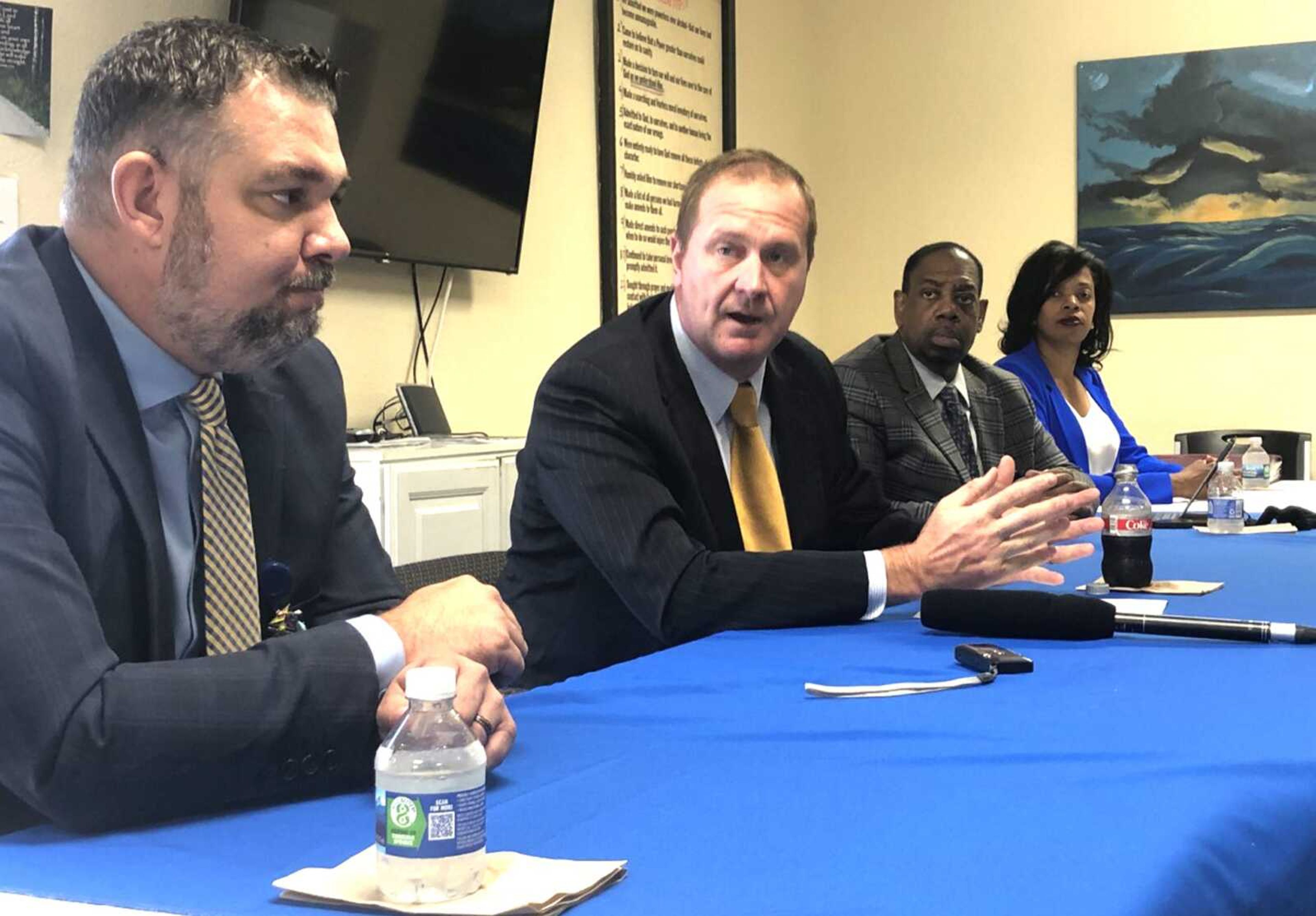Missouri AG Schmitt encouraging counties to drop opioid suits
Missouri Attorney General Eric Schmitt says the state will be in a good position to collect more than a half-billion dollars as part of a negotiated multistate opioid lawsuit settlement, but only if several Missouri counties and municipalities, including Cape Girardeau County, drop their opioid lawsuits...
Missouri Attorney General Eric Schmitt says the state will be in a good position to collect more than a half-billion dollars as part of a negotiated multistate opioid lawsuit settlement, but only if several Missouri counties and municipalities, including Cape Girardeau County, drop their opioid lawsuits.
However, the county has not received a formal request from the attorney general's office to join the state settlement and, at least for now, is moving forward with its own opioid litigation.
Speaking at the Gibson Recovery Center in Cape Girardeau on Monday, Schmitt discussed the next steps the state is taking to secure its share of a $26 billion settlement reached in July with Johnson & Johnson and three of the biggest drug distribution companies in the nation.
Missouri and several other states sued Johnson & Johnson and other opioid makers and distributors. In his comments Monday, Schmitt described opioid addiction as "a difficult disease" and said, "What drug manufacturers have done to misrepresent the addictive nature of these drugs was egregious." He said the settlement will enable Missouri and other states to provide resources to support drug addiction programs.
"This will be the largest victims-centered settlement in the history of the State of Missouri," Schmitt told a group of addiction specialists, law enforcement representatives and area legislators who had gathered at the Gibson Center to hear about the "next steps" in the settlement distribution.

"Unlike the tobacco settlement of a generation ago, where that money just went to GR (general revenue) and we hoped it ended up in the right place, the way this is structured is that Missouri's share (of) just over a half a billion dollars (will) go to places like this and other providers who are providing lifesaving treatment and medication for people," Schmitt said.
The attorney general's appearance in Cape Girardeau was the first of several stops he plans to make throughout the state in the coming days to encourage counties and municipalities to abandon their individual opioid litigation. He said unless the separate lawsuits are dropped by the end of the year, the state's settlement amount could be reduced by approximately half.
"Many municipalities and counties have engaged in their own lawsuits over the last few years and it will be very important for them to sign on to this global settlement," Schmitt said. "Our effort between now and Jan. 2 is to get those local jurisdictions to sign on to this to absolutely maximize the benefit for Missourians."
During its 2020 legislative session, the Missouri Legislature established a mechanism through which settlement funds will be distributed through a grant application process with funds, in turn, distributed through the Missouri Department of Health and Senior Services, the Missouri Department of Mental Health, the Missouri Department of Public Safety and the Missouri Department of Social Services.
"It's our belief the funds will likely be distributed sometime next spring, if all goes well," Schmitt said.
Some of the funds would be used to hire additional treatment and counseling staff at places such as the Gibson Center, FCC Behavioral Health and the Community Counseling Center.
Cape Girardeau County Second District Commissioner Charlie Herbst told the Missourian on Monday the county has not been contacted by Schmitt's office regarding its opioid litigation, which it filed in July 2018. He said the County Commission was also not aware of Schmitt's appearance in Cape Girardeau to discuss the multistate settlement.
Cape Girardeau County is among at least a dozen counties and municipalities represented by Jack Garvey with the St. Louis law firm of Carey Danis & Lowe in opioid litigation. Several other Missouri counties and communities have also filed their own opioid lawsuits.
"There has been no direction or guidance" from Garvey, Herbst said when asked whether the county is considering dropping its lawsuit.
According to the Centers for Disease Control and Prevention (CDC), opioid misuse and overdoses were responsible for approximately 93,000 deaths in the United States in 2020.
"The opioid epidemic has ravaged so many communities," said John Gary, Gibson Center executive director. "Cape Girardeau and surrounding communities are not exempt. In Missouri, last year we experienced overdoses at an alarming rate, and it's up about 19% this year, so we still have work to do."
Looking for business news? Check out B Magazine, and the B Magazine email newsletter. Go to www.semissourian.com/newsletters to find out more.
Connect with the Southeast Missourian Newsroom:
For corrections to this story or other insights for the editor, click here. To submit a letter to the editor, click here. To learn about the Southeast Missourian’s AI Policy, click here.










